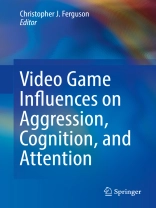This book addresses the ongoing scientific debates regarding video games and their effects on players. The book features opposing perspectives and offers point and counterpoint exchanges in which researchers on both sides of a specific topic make their best case for their findings and analysis. Chapters cover both positive and negative effects of video games on players’ behavior and cognition, from contributing to violence and alienation to promoting therapeutic outcomes for types of cognitive dysfunction. The contrasting viewpoints model presents respectful scientific debate, encourages open dialogue, and allows readers to come to informed conclusions.
Key questions addressed include:
· Do violent video games promote violence?
· Does video game addiction exist?
· Should parents limit children’s use of interactive media?
· Do action video games promote visual attention?
· Does sexist content in video games promote misogyny in real life?
· Can video games slow the progress of dementia?
· Are video games socially isolating?
Video Game Influences on Aggression, Cognition, and Attention is a must-have resource for researchers, clinicians and professionals as well as graduate students in developmental psychology, social work, educational policy and politics, criminology/criminal justice, child and school psychology, sociology, media law, and other related disciplines.
Spis treści
Chapter 1. Introduction.- Chapter 2. Violent Video Games Do Promote Violence.- Chapter 3. The Infamous relationship between violent video game use and aggression: Uncharted moderators and small effects make it a Far Cry from certain.- Chapter 4. Making the case for Video Game Addiction: Does it exist or not?.- Chapter 5. Helping Parents Make Sense of Video Game Addiction.- Chapter 6. The Digital Dilemma: Why Limit Young Children’s Use of Interactive Media?.- Chapter 7. Children Should Not be Protected from Using Interactive Screens.- Chapter 8. Playing Action Video Games Boosts Visual Attention.- Chapter 9. Action Games Do Not Promote Visual Attention.- Chapter 10. The Concerns Surrounding Sexist Content in Digital Games.- Chapter 11. Blame the Players, Don’t Blame the Games – Why We Should Worry Less about Sexist Video Game Content and Focus More on Interactions between Players.- Chapter 12. Brain-Training Games Help Prevent Cognitive Decline in Older Adults.- Chapter 13. Video Gamesand Dementia: Evidence Needed.- Chapter 14. For Better or Worse: Game Structure and Mechanics Driving Social Interactions and Isolation.- Chapter 15. Video Games Are Not Socially Isolating.
O autorze
Christopher J. Ferguson, Ph.D., is a professor of psychology at Stetson University in Deland, FL. He has published dozens of articles related to video game influences on behaviors, including video game violence, addiction issues, and representation of female characters in games. He is a fellow of the American Psychological Association and received an Early Career Scientist Award from the Media Psychology and Technology Division of the APA. He also publishes fiction, including a novel, Suicide Kings and short stories that are available at his website Christopher JFerguson.com.












